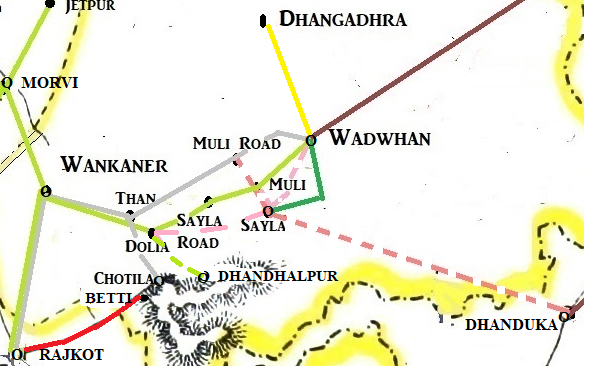Wadhwan-Sayla Tramway
The Wadhwan-Sayla Tramway opened in 1924 with a distance of 17 miles(27km) and worked by Bhavnagar State Railway under agreement with Wadwhan State and Sayla State. The metre gauge(MG) steam operated Tramway ran from the ‘Bhavnagar State Railway’ station at Wadhwan to Sayla as a direct line.
Construction commenced in 1922 and was built with the help of an Agency of the ‘Bhavnagar State Railway’ [1].
History
Wadhwan-Sayla-Dolia Railway Proposal
Shown in Dotted Pink on map.

1900. Colonel Hunter’s ‘Famine Relief Scheme’.
Wadhwan via Sayla to Dolia
Paid for by Wadwhan State and Sayla State Durbars.
Not completed due to objections by Morvi State Durbar.
Earthworks built before Morvi Durbar objected and the scheme abandoned [2].
Wadhwan-Sayla-Muli Tramway Proposal
Shown in Dotted Pink on map.
1904. A private Tramway was proposed by Mr. Bhagubhai Shambhunath of Ahmedabad.
For a steam tramway from Wadhwan via Sayla to Muli
Was not built due to the punitive requirements of the Morvi Durbar for use of their land. [3].
Dhandhalpur-Morvi Railway Extension Proposal
Shown in Dotted Llight Green on map.
1906. Morvi State proposed an extension to Dhandhalpur [4].
The project did not proceed.
Salya-Morvi Railway Extension Proposal.
Shown in Dotted Rose Pink on map.
1914. Sayla asked Morvi to build a branch from Muli to Sayla to compensate for the loss of communication.
But the Muli State Durbar, which was under British Administration, would not agree to the unreasonable demands of the Morvi Durbar for free passage through their lands and having to pay for the crossing of the Bhogava River.
The Political Agent refused on behalf of the 3 minor Principalities as there was nothing for them to gain and all to gain for Morvi [5].
This proposal also included a extension to Dhandhuka
None of these proceeded.
Wadhwan to Sayla Tramway
Shown in Dark Green on map.
1919. The Government of India in 1919 allowed latitude to rulers of the States for constructing Tramways, previously Tramways in Kathiawar were under the control of the Government.
1922. Under these rules on the 2 June 1922 the Wadhwan to Sayla direct Tramway was agreed, a distance of 19 miles (31km). It joined the ‘Bhavnagar State Railway’ at Joravarnagar making it a junction, Joravarnagar was 2 miles (3.2Km) inside the Wadhwan Durbar Territory and just south of the Bhogava river crossing. Before construction the scheme had been referred to the Thakor Saheb of Morvi in June 1921 and received no objections[6].
1924. The line opened at a cost of Rs460,000. For the first few years lost Rs6,700 a year ([7].
This caused disagreement with Morvi Durbar as it stopped the line across country.
1926-1934. Morvi claimed compensation in 1926 and Sayla counter claimed in 1926. Compensation was agreed between Sayla and Morvi of Rs10,000 payable over 10 years. An appeal to the Secretary of State for India in London was made. This upheld the decision to go to arbitration, but sat on the fence regarding as to whether Morvi was entitled to any compensation [8]. Against this ruling, due to some confusion between the various parties in 1931 [9] ,a final settlement was made in February 1934 [10].
Records
The India Office Records (IOR) records held at the British Library relating to this tramway gives the following: -
“British Library Archives and Manuscripts Catalogue” - Photo 1/17(67)
With the following catalogue information:-
Wilberforce-Bell Collection: Photographs 1914-1926: Photo 1/17(67); “At the opening of the Wadhwan-Sayla Tramway, [?] Jorawarnagar. Photographer: Unknown; 1924”.
This with the Catalogue comment “Group portrait of garlanded figures standing in front of marquee. Figures identified beneath print are as follows: H.H. the Maharaja of Bhavnagar (minor); the Thakur Sahib of Wadhwan; Mr Bibra; K.S. Kanaksinhji of Sayla; Colonel Burke; Harold and Margaret Wilberforce-Bell. Location = Gujarat; India; Jorawarnagar [?]”
References
- ↑ 1943 ‘Kathiawar Economics’ by A B Trivedi, 1943 Digital Library of India Archive.org, Appendix B ‘Railways in Kathiawar with opening dates, page 192(pdf215); Retrieved 22 May 2020
- ↑ “British Library” IOR/R/2/735/217 No R/C/217 Morvi Railway Conversion, Letter 6
- ↑ 'The history of Kathiawar' by Captain Wilberforce Bell, William Heinemann, London, page 262, pdf 301 ; Retrieved 22 May 2020
- ↑ British Library IOR/L/PS/13/1694 No 33 File 30 ‘Memorial of the Thakor of Sayla against the decision for Morvi to claim compensation’ (part 1) page 4 Paragraph 9
- ↑ IOR L/PS/13/1694 No 33 File 30 (part 2) paragraph 33
- ↑ IOR L/PS/13/1694 No 33 File 30 Part 1 Appendix C
- ↑ IOR L/PS/13/1694 No 33 File 30 Part 2 Page 20
- ↑ IOR L/PS/13/1694 No 33 File 30, Part 2 Pages 25-26
- ↑ IOR L/PS/13/1694 No 33 File 30, Part 2 Page 19
- ↑ IOR L/PS/13/1694 No 33 File 30, Part 2 Page 3